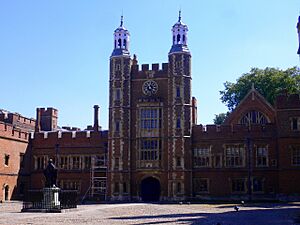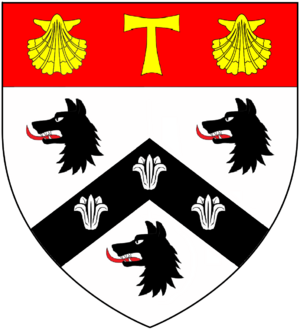Roger Lupton facts for kids
Roger Lupton (1456–1540) was an important English lawyer and church leader. He served as a chaplain to two famous kings, King Henry VII and his son King Henry VIII. He was also chosen by King Henry VII to be the head of Eton College, a famous school, from 1503/4 to 1535.


Contents
Where Roger Lupton Came From
The Lupton family originally came from a place called Lupton in Cumbria, near Kirkby Lonsdale. The family name first appeared in records during the 1400s.
Roger Lupton's Life and Work
Roger Lupton was born in 1456 in a town called Sedbergh, which was then in Yorkshire. He was the son of Thomas Lupton.
He first went to Cambridge University in 1479, where he studied at King's College. This college was closely linked to Eton College, and Roger later played a big part in Eton's growth. He earned his degree in church law in 1484 and a higher degree in 1504.
After finishing his studies in 1484, Roger Lupton worked in the Court of Chancery, which was an important court of law. He also became the Rector (a type of priest) of Harlton in Cambridgeshire. In 1500, he became a Canon of Windsor, which meant he was a priest at St George's Chapel in Windsor Castle. He held this position until he died.
In 1503/4, he was chosen to be the Provost of Eton College, a very important role. He stayed as Provost until 1535. Around 1509/10, he also became the Master of St. Anthony's Hospital, St Benet Fink in London. Since this hospital was connected to St. George's College at Windsor, the king appointed him to this role.
Founding Sedbergh School
In 1525, Dr. Roger Lupton started to provide money to create Sedbergh School in his hometown of Sedbergh. It was a "Chantry School," which was a school connected to a church. A few students began learning there with a chaplain named Henry Blomeyr.
Roger Lupton had two main reasons for starting the school:
- To help learning grow in the Christian Church.
- To help his own spiritual well-being.
An agreement was made so that the chaplain and students could have free seats in the church. Sedbergh School still uses Roger Lupton's family coat of arms as its symbol today.
In 1527, he set up six scholarships for boys from Sedbergh School to attend St John's College, Cambridge. He preferred boys who were related to him, as he had no children of his own. These boys also needed to come from families with "lands truly purchased" and well-built homes.
A document from St John's College explains that the students were to be chosen from Sedbergh School, where Roger Lupton was born and had started a special school with good land and buildings.
After land was bought and a school building was constructed (likely where the current School Library is), the official agreement was signed. This agreement connected the school to St John's College, Cambridge, which then had the power to choose the Headmasters. In 1535, Roger Lupton created two more scholarships for Cambridge and also provided for two Fellowships (positions for advanced scholars).
Death and Burial
Roger Lupton passed away on February 27, 1540. He was buried in a special part of the main chapel at Eton College, known as Lupton's Chapel, which he had commissioned himself.
His monumental brass (a metal plate with his image and details) can still be seen at Eton. It shows him dressed as a Canon of Windsor, wearing a long robe with a cross. A tall structure at Eton College, called Lupton's Tower, was built during his time as Provost and is named after him. Every year on February 27, Eton College remembers his death with a special event called Threepenny Day, which he started.
Roger Lupton's Coat of Arms
Roger Lupton was a chaplain to both King Henry VII and his son King Henry VIII. He was also responsible for carrying out King Henry VII's will after the king died. King Henry VII gave Roger Lupton his own coat-of-arms.
The coat of arms had a special design:
- It showed three wolves' heads, which was a clever way to refer to his name, as "Lupus" is Latin for "wolf."
- It also had three lilies, which are part of the design of Eton College's own coat of arms.
- A Tau cross was included, which was a symbol of Saint Anthony of Egypt. This likely referred to Roger Lupton's role as Master of St. Anthony's Hospital.
- The top part of the arms, called the crest, showed a wolf's head.
Sir John Burke, a famous expert on family symbols, described the coat of arms in 1844. He noted that the wolf's head and neck were from the arms given to Roger Lupton by King Henry VII.
See also
 | James Van Der Zee |
 | Alma Thomas |
 | Ellis Wilson |
 | Margaret Taylor-Burroughs |


